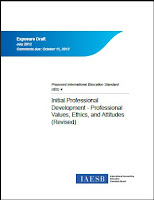A recent news article on the website of the Institute of Chartered Accountants of Scotland (ICAS) observes that: “Integrated reporting (IR) continues to move forward. There are now 83 pilot companies across the world which are testing out the integrated thinking processes necessary to deliver integrated reports and experimenting with how best to communicate the resulting information.” It also states that: “A prototype IR Framework was released at the end of November, which shows the direction of travel, and a 3 month consultation on a proposed framework will be published in April 2013. It is hoped that a final version of the Framework will be published in early 2014.”
According to this article, the integrated report is likely
to replace today's annual report as the main communication to the company’s
stakeholders. It is likely to contain a
varied mix of different types of information - past, present and forward looking,
financial and non financial. Some of the information may be extracted from the
financial statements, CSR report, Governance report, etc. But, how will users
know whether the report contains all the most important information or whether
it is so slanted towards the positive that it is not really giving a realistic
view?
In this regard, auditors could express a “balanced and
reasonable” opinion on an integrated report. This would provide slightly less
assurance than the opinion on the financial statements, reflecting the more
judgmental basis of the information in the integrated report, the mix of
different types of information, and the fact that less of the information will
be objectively verifiable, thereby relying much more on the auditor’s judgment. Also, with a greater degree of forward
looking information, the inherent inability of anyone to predict the future
means that a lower level of assurance is inherent.
“... it is important, though, that a positive opinion is clearly expressed, so that users can understand the nature of assurance being given, and that this will underlie the credibility of integrated reports...negative assurance and reporting by exception are too confusing to users. The auditing profession is perfectly capable of making the necessary judgments to express a positive opinion in this way, although greater judgment will be involved, and the auditor liability regime in some countries may make the auditors slightly reluctant.”
Learn more by reading the online article “Integrated Reporting: the challenge of assurance” by David Wood, ICAS Executive Director of Technical Policy and Services. In addition, see the related articles “A Template for Integrated Reporting” and “A professional judgment framework for financial reporting.”
























